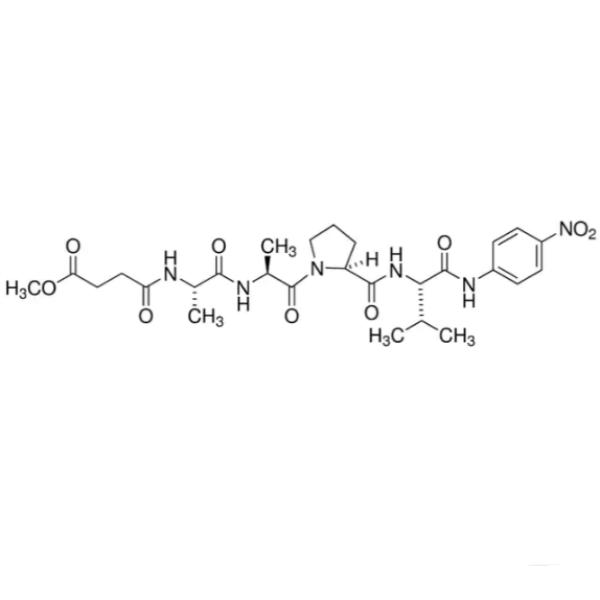Chemical Properties:
Package: Penicillin Bottle, Aluminium foil bag, or according to customer's requirement. Storage Condition: Store in sealed containers at cool, dry and ventilated warehouse away from incompatible substances. Protect from light and moisture.Shanghai Ruifu Chemical Co., Ltd. is the leading supplier of MeOSuc-AAPV-pNA (CAS: 70967-90-7) with high quality. We can provide worldwide delivery, small and bulk quantities available. If you need MeOSuc-AAPV-pNA, Please contact: alvin@ruifuchem.com| Safety Statements | 22-24/25 | F | 10-21 |
| WGK Germany | 3 | HS Code | 2922491990 |
Description:
Safety Information:
Package & Storage:
| Chemical Name | MeOSuc-AAPV-pNA |
| Synonyms | MeOSuc-Ala-Ala-Pro-Val-pNA; N-Methoxysuccinyl-Ala-Ala-Pro-Val p-Nitroanilide; N-Methoxysuccinyl-Ala-Ala-Pro-Val-pNA; N-(Methoxysuccinyl)-L-Alanyl-L-Alanyl-L-Prolyl-L-Valine 4-Nitroanilide, N-(Methoxysuccinyl)-Ala-Ala-Pro-Val 4-Nitroanilide |
| Stock Status | In Stock |
| CAS Number | 70967-90-7 |
| Molecular Formula | C27H38N6O9 |
| Molecular Weight | 590.63 g/mol |
| Melting Point | 203.0~205.0℃ |
| Boiling Point | 958.4±65.0℃ |
| Density | 1.297±0.06 g/cm3 |
| COA & MSDS | Available |
| Brand | Ruifu Chemical |
Advantages:
How to Purchase? Please contact Dr. Alvin Huang: sales@ruifuchem.com or alvin@ruifuchem.com 15 Years Experience? We have more than 15 years of experience in the manufacture and export of a wide range of high quality pharmaceutical intermediates or fine chemicals. Main Markets? Sell to domestic market, North America, Europe, India, Korea, Japanese, Australia, etc. Advantages? Superior quality, affordable price, professional services and technical support, fast delivery. Quality Assurance? Strict quality control system. Professional equipment for analysis include NMR, LC-MS, GC, HPLC, ICP-MS, UV, IR, OR, K.F, ROI, LOD, MP, Clarity, Solubility, Microbial limit test, etc. Samples? Most products provide free samples for quality evaluation, shipping cost should be paid by customers. Factory Audit? Factory audit welcome. Please make an appointment in advance. MOQ? No MOQ. Small order is acceptable. Delivery Time? If within stock, three days delivery guaranteed. Transportation? By Express (FedEx, DHL), by Air, by Sea. Documents? After sales service: COA, MOA, ROS, MSDS, etc. can be provided. Custom Synthesis? Can provide custom synthesis services to best fit your research needs. Payment Terms? Proforma invoice will be sent first after confirmation of order, enclosed our bank information. Payment by T/T (Telex Transfer), PayPal, Western Union, etc.FAQ:
Stable Supply: Maintain reasonable stock
Professional Service: One stop purchasing service
Technical Support: Technology solution available
Custom Synthesis Service: Ranged from grams to kilos
Fast Delivery: If within stock, three days delivery guaranteed
High Quality: Established a complete quality assurance system
Sufficient Capacity: Sufficient facilities and technicians
OEM Package: Custom package and label available
Specifications:
| Items | Inspection Standards | Results |
| Appearance | White or Off-White Crystalline Powder | Conforms |
| Assay | >98.0% | 98.93% |
| Conclusion | This Product by Inspection Accords with the Enterprise Standard | |
| Main Uses | Chromogenic Substrate | |
Application:
MeOSuc-AAPV-pNA (CAS: 70967-90-7) is a highly sensitive peptide substrate that is hydrolyzed by both human and mouse neutrophil elastase and PR3, but not cathepsin G or chymotrypsin. MeOSuc-AAPV-pNA is cleaved at 405-410 nm. MeOSuc-AAPV-pNA, Chromogenic Substrate is a sensitive chromogenic substrate for PR3 (proteinase 3; PRTN3) and neutrophil elastase. PR3 is a polymorphonuclear leukocyte (PMNL) serine proteinase that degrades a variety of matrix proteins including fibronectin, laminin, vitronectin, and collagen type IV and contributes to the proteolytic generation of antimicrobial peptides. Neutrophil elastase is a serine proteinase that during inflammation, is secreted by neutrophils to destroy bacteria as well as host tissue. Evaluating human and murine PR3 and neutrophil elastase enzymes are helpful to understanding PR3-related and inflammatory autoimmune processes. Researchers have used this product in cystic fibrosis research, as elastin degradation has been reported to increase in cystic fibrosis patients. Hydrolysis or cleavage of this substrate product can be detected at 405-410 nm. This product is not a suitable substrate for cathepsin G nor chymotrypsin.
